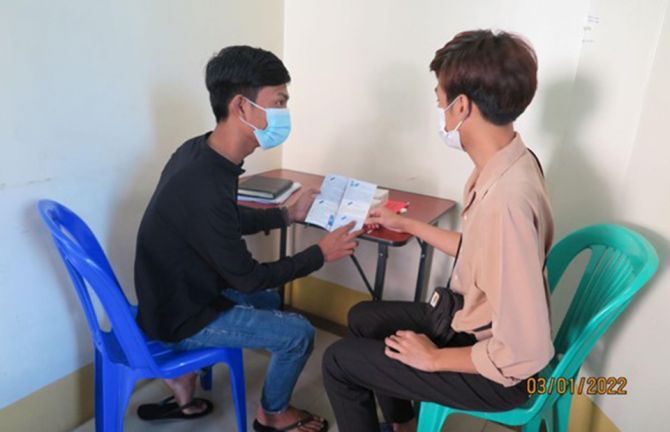



Feature Story
PrEParing for the next chapter of HIV prevention in Myanmar
19 September 2022
19 September 2022 19 September 2022Two young men are sitting on a couch scrolling on their phones when May Oo, a famous makeup artist and lesbian, gay, bisexual, transgender, and queer (LGBTQ) activist in Myanmar, joins them wearing a face mask and carrying a bag of drinks. He announces that a friend who works at an HIV clinic in Yangon told him that pre-exposure prophylaxis, or PrEP, is now available in Myanmar. As one friend is unaware of PrEP, May Oo shares his knowledge, also informing anyone else wo would like to listen in.
This scene, from a video shared on the Facebook pages of implementing partners of the USAID HIV/AIDS Flagship (UHF) Project, is one of several to raise awareness and demand PrEP as a prevention tool for men who have sex with men and transgender women in Myanmar. In these videos by celebrated members of the LGBTQ community and other educational posts, questions covered include what PrEP is, why it should be taken, and where to get it. As May Oo’s friend in the video puts it, ‘PrEP is a drug that can prevent HIV.’
Since 2016, PrEP has been included as a priority intervention in Myanmar’s National Strategic Plan on HIV/AIDS following recommendation by the World Health Organization that it be used as an essential part of HIV prevention services. It was also an objective of the UHF Project to introduce PrEP in Myanmar and integrate it into existing HIV services, since the project’s inception in August 2017.
The UHF Project, overseen by UNAIDS Myanmar and the non-governmental organisation Community Partners International, aims to develop, implement, and scale up innovative, cost-effective approaches to the HIV care cascade in Myanmar. As one of the innovative HIV prevention activities under the National Strategic Plan IV (2020-2025), the initial 18-month PrEP demonstration project began in July 2020 at three clinics in Yangon for men who have sex with men and transgender people.
Along with the pilot was a plan to expand the project for people who inject drugs in Kachin State since the UHF Project’s overarching goal is to foster interventions such as PrEP for Myanmar’s four key populations at highest risk for HIV—people who inject drugs, men who have sex with men, transgender people, and female sex workers in the five states and regions with the highest burden of HIV—Kachin and Shan States and Mandalay, Sagaing, and Yangon.
Formative assessments conducted prior to the inception of these PrEP services indicated that PrEP awareness in Myanmar was very low. Fewer than a quarter of focus group participants—comprised of men who have sex with men, transgender women, and people who inject drugs—had heard of PrEP prior to the assessment. Service providers interviewed as part of the assessments also described low PrEP awareness among their clients.
Once educated about PrEP, however, most study participants agreed that PrEP would benefit their communities and that people at risk would be interested and willing to take PrEP. Awareness raising and community education have been one of the UHF Project’s focuses to increase PrEP uptake in Myanmar.
That is where videos such as May Oo’s are important. By using celebrities, private chat groups, and informational posts alongside interactive follow up by service providers for recruitment of PrEP clients, implementing partners not only educate people at risk for HIV on PrEP as a prevention option but also address the stigma around it.
Respondents to a midterm analysis conducted one year into the PrEP project reported that Facebook was the primary source of PrEP information and education, as the potentially more effective approach of fully-fledged in-person outreach is not feasible in the country’s current situation.
‘There are many in rural areas who do not have access to or use social media platforms,’ reports Ma Shin Thant, a PrEP client and activist currently based in Mandalay for her work with transgender women. As PrEP is currently only available in Yangon, Ma Shin Thant is fortunate that she can afford access to required testing and PrEP delivery in Mandalay.
‘The next chapter of PrEP in Myanmar calls for greater political commitment, more resources, a decentralised and simplified delivery system, and innovative community-centred approaches to ensure access by populations who need PrEP,’ concurs Rangaiyan Gurumurthy, UNAIDS Myanmar Country Director. ‘Moving from the demonstration phase to reaching scale with epidemic impact is now necessary.’



